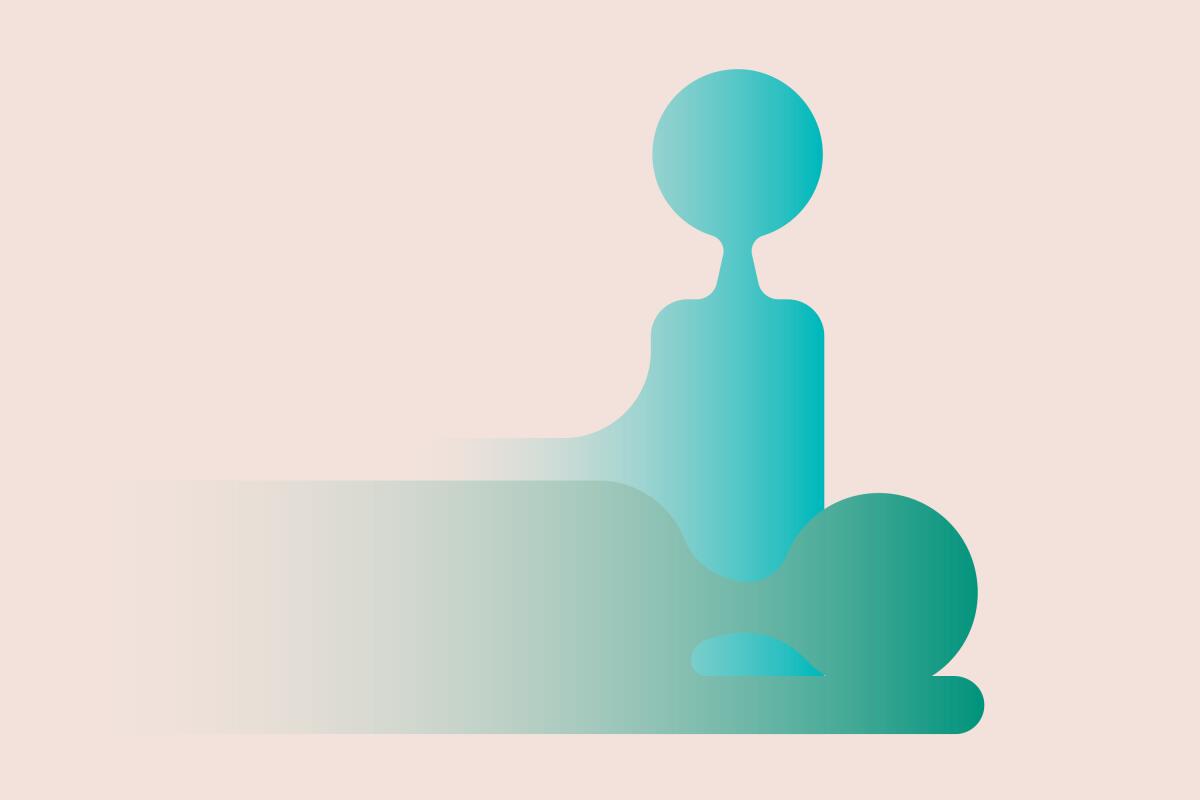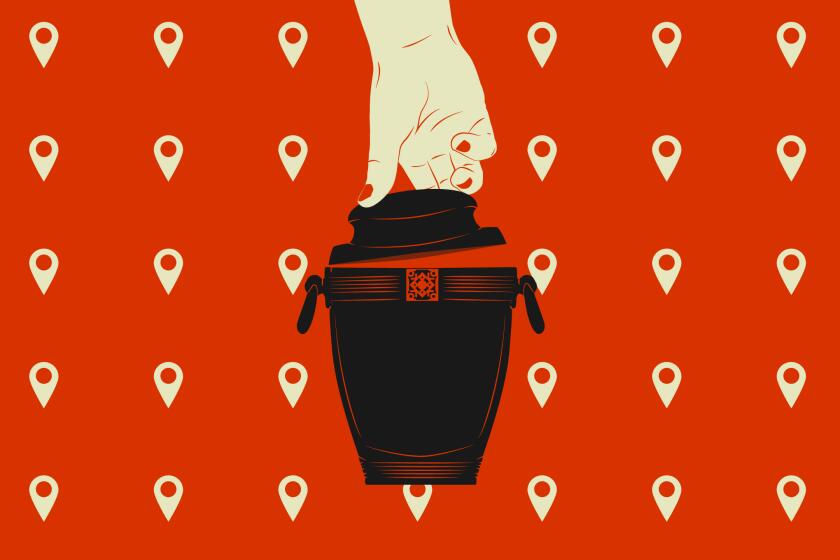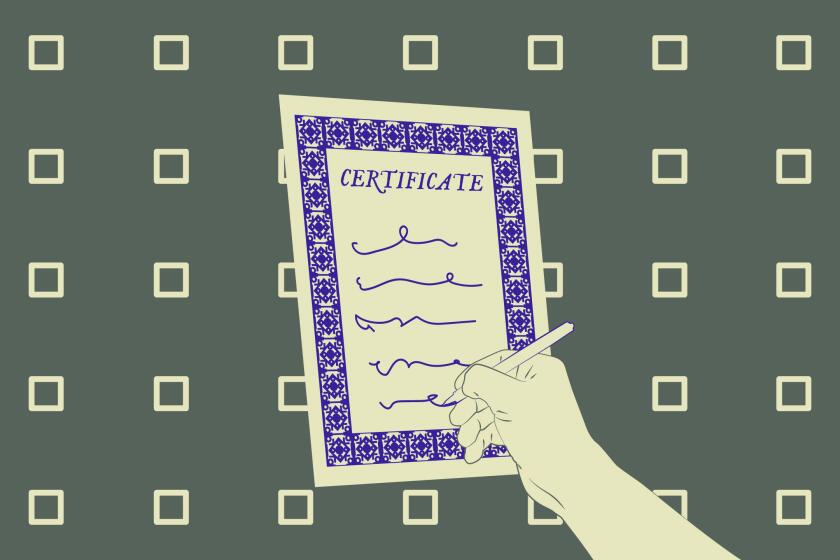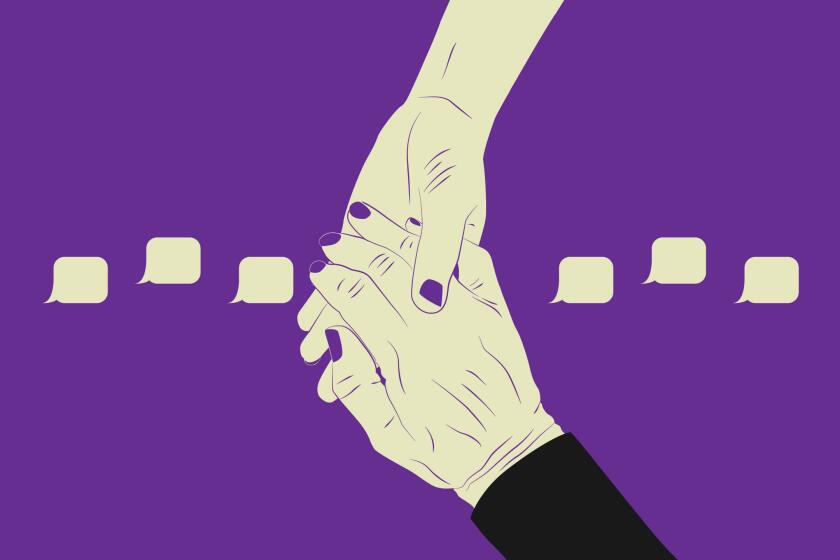It’s common to dream about dead loved ones. How do these dreams help us through our grief?

- Share via
This story was originally published in Group Therapy, a weekly newsletter answering questions sent by readers about what’s been weighing on their hearts and minds. Sign up here to get it in your inbox.
For thousands of years, humans have spilled endless ink about dreams, in psychological literature and novels and philosophical texts. Yet their purpose remains largely a mystery. In fact, some neurobiologists think that dreams have no function at all.
Personally, I believe that dreams can be meaningful and useful. This may be especially true when we’re struggling; one theory hypothesizes that dreams allow us to re-process upsetting memories in a safer, calmer environment. “REM-sleep dreaming appears to take the painful sting out of difficult, even traumatic, emotional episodes experienced during the day, offering emotional resolution when you awake the next morning,” writes Matthew Walker, a professor of neuroscience and psychology at UC Berkeley.
This may be one explanation for why loved ones who’ve passed away sometimes appear in our dreams.
Get Group Therapy
Life is stressful. Our weekly mental wellness newsletter can help.
You may occasionally receive promotional content from the Los Angeles Times.
A Group Therapy reader sent us a question about such a dream:
“My mom died three years ago at age 60. I’m slowly learning to live with the grief and the seismic shifts losing her has created in my life. I no longer spend the whole day missing her the way I did early on, and can actually live a pretty normal, emotionally stable life most days (the grief still cycles through, but with less frequency and intensity). The issue I’m having is in my dreams. More than ever I’ve started having dreams with my mom in them. She’s almost always criticizing me or telling me what I’m doing in the dream is wrong. I am usually calmly explaining to her that I’m not going to do what she says — Sorry, mom.
This feels like my brain doing self-therapy, trying to work through our relationship as two independent adults even though the opportunity to do that with her is long gone. I’m curious why I might be having these sorts of dreams now as opposed to right after she died, and how common it is to dream about lost loved ones more than the people you see all the time.”
In today’s newsletter, we’ll explore theories on why we have so-called “grief dreams,” what forms they can take, and what they can tell us about our waking life.
L.A. is a complicated place to live. Does it have to be such a complicated place to scatter ashes after someone dies?
How common are grief dreams?
Joshua Black’s father died unexpectedly when he was in college. It was the first time he’d lost someone he cared for, and he fell into a deep depression.
Three months into the void that was his grief, Black had a dream: His dad was in Black’s room, and he looked happy and healthy. This was significant because his dad suffered a lot in his life, and drank heavily to cope. But in this dream, he emitted joy. Black walked up to his dad and told him he loved him, and said goodbye.
“I woke up and everything was different,” Black told me. “The color returned to my world. And I was like, what was that?”
Black wanted to know why this dream and others like them hold so much significance for people. He began to explore this question during his time as a PhD psychology student at Brock University in Ontario, Canada.
In a 2019 study, Black and other researchers found that 86% of people who experienced the death of a romantic partner or spouse had dreamed about their deceased loved one in the first two years after the death. Other studies have found that 53% to 75% of bereaved people dreamed of the deceased.
This tracks for me. After my grandma died, I’d have dreams of us hanging out — nothing more than us sitting together in her living room, in the house she and my grandpa sold when I was 9 years old. The dreams were so vivid, it was as if I was really connecting with my grandma as I knew her when I was a kid. She was sick for a long time before she died in 2012, and I’d almost forgotten what she was like before everything changed. The dreams reminded me.
When someone you care for dies unexpectedly, many responsibilities will fall onto your shoulders. Here’s a guide to what they are and how to handle them.
Why do we have grief dreams?
So, it appears that these dreams are pretty common. But why do we have them?
No one really knows. But Black and other researchers have some theories.
These dreams may have an evolutionary purpose, Black said — to help us survive personal tragedy. Grief dreams may help regulate the emotions of the bereaved, who often have a hard time sleeping (in large part because our bodies secrete more of the stress hormone cortisol when we’re grieving), thinking and getting things done throughout the day.
“You might have these positive dreams, like I had, which can really elevate someone’s mood,” Black said. “Or you might have a more difficult dream; this might happen if someone is avoiding the loss, and it can help them face the truth — that their loved one has died. Sometimes we need to go there, to really feel the pain. One of the tried-and-true methods of our society is to avoid our pain. These dreams can help us start feeling our feels.”
Grief dreams can also help you maintain the bond you had with your loved one. Freud said something like “You shouldn’t think about or want a relationship with the deceased.” That’s the opposite of what needs to happen, said Marilyn Mendoza, a clinical professor at Tulane University Medical Center and a private practice psychologist specializing in bereavement. “You are connected, and you need to be able to stay connected during your grief. If that’s how you do it, through dreaming, then that helps with the grief.”
So much of our identities are wrapped up in our relationships with other people — how they see us, how they love us. When one of our loved ones dies, we are in some ways left to our own devices, and we are forced to figure out new ways to see ourselves and move through the world, Black said. “These dreams can give people the opportunity to feel it again — that love is not lost,” and the sense of who you are in relation to that person, he added.
Talking about burial arrangements or end-of-life care isn’t the easiest conversation to have with family members. But it can be done with respect, humility and love.
Not all grief dreams are pleasant
Dreams can also help us process complicated feelings that can be tangled up in our grief, like regret or guilt. This may happen if someone has died by suicide, or you weren’t able to say goodbye to your loved one at the end of their life, as was the experience of many grievers during the pandemic. “These dreams may involve the deceased explaining why they died, saying that they love you, or that it’s OK, you’re forgiven,” Black told me. “It relieves some of the burdens that we carry.”
Other times, your mind may be more actively trying to make sense of what you’re going through and incorporate the loss into the narrative of the rest of your life. This may lead to challenging dreams — or trauma dreams, as researchers call them — which are more likely to crop up if anger, guilt or blame are part of your grief experience, or if the deceased died in a traumatic way like an accident, murder or suicide. Your loved one may be dying again in these dreams, or they could be chasing or criticizing you. They can often be recurring, Black said.
In his research, Black found that bereavement dreams tend to be overwhelmingly positive. But 40% of his study participants said they had at least one challenging grief dream about their deceased loved one.
In other words, these dreams are hard, but it’s so normal to have them. And they’re full of information for us.
“Oftentimes when we have these dreams that replay how people died or other gruesome visions, it’s letting us know that we have dis-ease in our life and need some healing and understanding,” said Jade Karling Black, a grief and bereavement researcher who co-hosts the podcast “Grief Dreams” with Joshua Black. “These might prompt some people to seek therapy, to spend more time developing awareness around how they’re relating to their grief and what it means to them.”
Grief dreams may happen more frequently when a death is recent, experts said, but they can happen at any time. Some people may even start having such dreams before their loved one dies, Mendoza said.
And dreams of the dead might return when your life becomes more difficult or you’re in transition, like during a divorce or at the end of your own life, Black said. Black heard from many people who said dreams of their loved ones gave them comfort and reassurance during the pandemic.
Mendoza recalled a time when she was moving her office from her workplace to her home, into the room where her mother lived at the end of her life. At this point, her mom had been gone for 20 years, but Mendoza had a dream that she was rearranging her office furniture in the room, and there was her mom, lying in a bed. “I don’t think you need to be a psychologist to figure that one out,” Mendoza said. “I was having trouble taking the room apart and making it into something else.”
What we can learn from our grief dreams
Whether our grief dreams are comforting or distressing, they may provide rich information for us — if we’re willing, or ready, to pay attention to them, experts said.
“I like to see grief dreams as not an enemy, but a friend — someone trying to make you aware of something you’re avoiding in waking life,” Black said. “They’re truth-tellers, in many ways.”
At the start of the pandemic, Black thought he was doing fine, all things considered. But then he had a terrible nightmare. After reflecting, he realized he wasn’t OK. “Our minds can trick us into believing we’re doing better emotionally than we are. Our dreams can help us pinpoint what we need to look at.”
When Mendoza works with clients who’ve had grief dreams, she helps them explore how it made them feel, and whether the dream carried a message for them. “The best interpreter of the dream is the dreamer,” she said.
How we interpret our dreams can be shaped by our spiritual and cultural beliefs. Some people see visitation dreams as a way to communicate with the dead, or messages from gods or deities.
Karling Black and Mendoza never dismiss these interpretations when they’re speaking with people about their grief dreams.
“If it makes sense to them and they feel good about it, it’s OK with me,” Mendoza said.
“Dreams are part of a realm that is not easily quantifiable,” Karling Black said, “as much as we try to do so.”
Our reader’s dream
I asked our experts how our reader might make sense of her dream. If they were her, what questions would they be asking themselves?
Here’s what they came up with:
- What was your relationship like with your mom? What was it like to set boundaries with her? How did you tend to communicate with her?
- What are you missing about your mom?
- What was happening in your life when you started having these dreams? Could these dreams be providing you a way to connect with your mom as you’re going through something?
Our reader said that these dreams started three years after her mother’s death. This delayed response could mean that she wasn’t quite ready to process her relationship with her mother until now, Karling Black said.
“Maybe now she’s over that really intense bout of grief that people often have following a death, and now she’s figuring out how to recalibrate herself,” she explained.
. . .
Through this newsletter, I’ve learned that grief dreams are a common and incredible part of the human experience, but one that can be hard to talk about because we haven’t been given the language. I’m grateful to folks like our experts who are normalizing and helping us make sense of our minds’ nocturnal movies, those that are painful and reassuring alike.
Until next week,
Laura
If what you learned today from these experts spoke to you or you’d like to tell us about your own experiences, please email us and let us know if it is OK to share your thoughts with the larger Group Therapy community. The email GroupTherapy@latimes.com gets right to our team. As always, find us on Instagram at @latimesforyourmind, where we’ll continue this conversation.
See previous editions here. To view this newsletter in your browser, click here.
Enjoying this newsletter? Consider subscribing to the Los Angeles Times
Your support helps us deliver the news that matters most. Become a subscriber.
More perspectives on today’s topic & other resources
Research shows that dreaming is not just a byproduct of sleep but serves its own important functions in our well-being. REM-sleep dreaming appears to take the painful sting out of difficult, even traumatic, emotional episodes experienced during the day, offering emotional resolution when you awake the next morning, writes Matthew Walker, a professor of psychology and neuroscience at the University of California, Berkeley.
In this 2008 L.A. Times feature story, a young Iraq war veteran faces a new enemy every night: sleep. Mitch Hood relived combat in his dreams, “or sometimes his mind creates new horror-filled scenarios,” writes Jia Rui-Chong. “Once, he punched his fiancee ... while having a nightmare. She insisted it didn’t hurt, but Hood has not stopped apologizing.” Nightmares and other sleep problems — commonly a symptom of post-traumatic stress disorder — are all too common among war veterans.
Other interesting stuff
Ahead of the Times’ next installment of Behold for Juneteenth, which will spotlight the path toward mental health and psychological freedom in Black L.A., my colleagues Kenan Draughorne and Jason Armond asked attendees of a recent WalkGood yoga session about how they’ve sought healing. Founded in June 2020, WalkGood provides spaces for bonding, primarily in L.A.’s Black community, through yoga classes, guided meditations and breath work, hikes, run clubs and other activities around L.A. and beyond.
Research has consistently shown that spending more time in nature is associated with better body and brain health. Birds in particular seem to be a specific source of these healing benefits, according to the Washington Post. “The special thing about birdsongs is that even if people live in very urban environments and do not have a lot of contact with nature, they link the songs of birds to vital and intact natural environments,” said Emil Stobbe, an environmental neuroscience graduate student at the Max Planck Institute for Human Development.
Mental health awareness has its limits, writes Martha Gill for the Guardian. Although attitudes towards milder and more common mental health conditions such as anxiety, low mood, stress or burnout have improved, more serious disorders such as schizophrenia and psychosis trail far behind. “In fact, when it comes to schizophrenia, we seem to be getting less enlightened. A study of 10,000 people spanning the three decades to 2020 found that by nearly all measures, stigma towards the disorder had worsened,” Gill goes on. “People were less likely to want someone with schizophrenia as a housemate or co-worker than in 1990. They felt more fear and less desire to help.”
Group Therapy is for informational purposes only and is not a substitute for professional mental health advice, diagnosis or treatment. We encourage you to seek the advice of a mental health professional or other qualified health provider with any questions or concerns you may have about your mental health.
Get Group Therapy
Life is stressful. Our weekly mental wellness newsletter can help.
You may occasionally receive promotional content from the Los Angeles Times.










